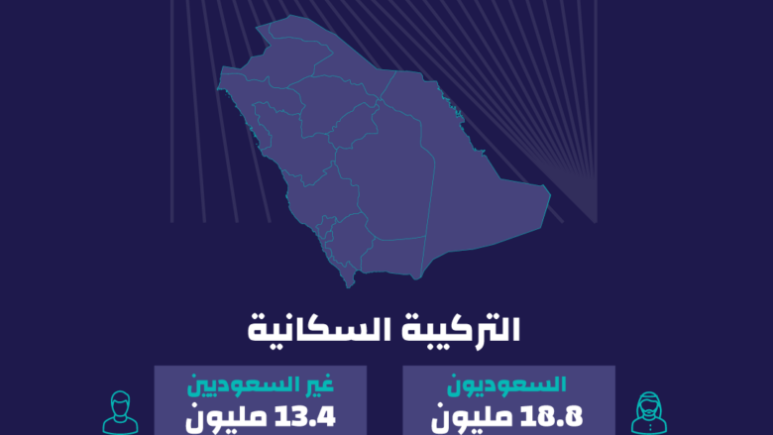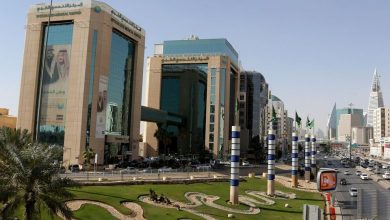Scandal Erupts over Saudi Arabia’s Controversial Population Census of 2033

In a shocking revelation, the Saudi Arabia 2033 population census has become embroiled in scandal due to stark discrepancies in the recently announced numbers, leading to widespread concerns and questions about the accuracy and transparency of the data.
Critics, including the opposition group “Al-Ahd Al-Jadid,” have pointed out that Crown Prince Mohammed bin Salman’s ambitious Vision 2030 aimed to increase the population to over 50 million, with half of that figure consisting of foreigners. However, the latest reports and information revealed a decline in the number of foreigners in the Kingdom and a noticeable flight of capital, raising serious doubts about the actual progress of the vision.
To address this alarming problem, Crown Prince Mohammed bin Salman and several high-ranking officials hastily formed a committee tasked with manufacturing statistical information that would corroborate the increasing number of foreigners in the Kingdom, the advancement of Vision 2030, and the purported influx of foreign capital into the country. Their objective was to convince both local and international public opinion of the accuracy and reliability of the forthcoming census data.
Over the course of several months, the committee meticulously crafted a persuasive scenario and media report in collaboration with the General Authority for Statistics. It is worth noting that the General Authority for Statistics had access to the database of the civil affairs department, which is linked to the National ID Card (NIC) and could have provided accurate numbers. However, the primary aim of this endeavor was propaganda, specifically to address the crisis of decreasing foreign populations in the Kingdom.
The committee, in coordination with the General Authority for Statistics, meticulously prepared the report, along with a corresponding media report outlining the key messages to be conveyed, potential risks, and anticipated questions and discussions that would arise concerning the discrepancies between the 2022 and 2010 census results. They also provided pre-determined answers to these questions.
Before the report’s publication, the committee reached out to various government entities, entrepreneurs, researchers, and university professors, compelling them to engage with and promote the misleading census data, ensuring its widespread dissemination.
Four main pillars were established for the media discourse that would accompany the release of the census results. These pillars included expressions of gratitude and appreciation to the leadership, emphasizing the accuracy and quality of the census data, and explaining the methodology employed in its preparation.
Furthermore, to perpetuate the deception, they recommended the use of specific hashtags such as #SaudiCensus2022 and a primary title: “General Authority for Statistics Announces the Main Results of the Saudi Arabia 2022 Census.”
A concerted effort was made to designate government-controlled accounts responsible for media coverage and disseminating information through various platforms. The emphasis was placed on highlighting keywords such as inclusivity, accuracy, highest data security standards, national project, and support for the leadership.
During their meetings, hypothetical questions were raised, assessing their likelihood and potential dangers, and predetermined answers were formulated. For example:
- Discrepancies between the population figure of Riyadh (7.5 million) mentioned by Crown Prince Mohammed bin Salman in a Future Investment Initiative forum interview and the current census results (6.9 million). The response provided was that the previously mentioned number only referred to the population within the administrative region of Riyadh and did not include its suburbs.
- Differences between the 2022 and 2010 census results address the need to rectify the scandal of inconsistent numbers. The answer was that the previously published figures were merely estimations, whereas the new results were deemed the most accurate. They also insinuated that the data’s quality and accuracy had significantly improved since the launch of Vision 2030, subtly undermining the efforts made during the reign of King Abdullah.
- As discussions progressed, the committee also delved into the decline in the number of households connected to the terrestrial internet network. They recommended misleading responses by citing statistics about the widespread adoption of 5G technology, diverting attention from the actual issue.
The scandal surrounding the Saudi Arabia 2033 population census has cast doubt on the reliability and credibility of the data presented, fuelling concerns about the government’s manipulation of information to serve its narrative. This controversy undermines the transparency and accountability necessary for an accurate understanding of the nation’s demographic landscape, raising questions about the true state of affairs within the Kingdom.
The Saudi Arabia 2022 census data confirms that the government’s statistics on unemployment, housing, income, and other aspects are all lies. As for human rights and detainees, the government’s numbers and data are falsehoods.
One of the main objectives of the Saudi Arabia 2022 census was to deceive the percentage of the Saudi population by undermining previous efforts and considering the statistics during King Abdullah’s reign as inaccurate. This was done to convince people that their numbers are small compared to the annual budget expenditures.
Mohammed bin Salman also wants to address and court the Western media to enhance his image and cover up the glaring human rights violations he is responsible for. He wants to claim that thanks to Vision 2030, the number of foreigners has increased and will continue to increase.
To further propagate the deception and reinforce the lies they have spread, they will present so-called experts and specialized analysts in the coming days. This includes the official spokesperson of the Royal Commission for Riyadh City and media figures from the Commission’s leadership, in addition to organizing a conference that brings together government and international entities interested in data science.
Because the Saudi Arabia 2022 census announcement is laughable, the committee behind it attempted to intervene in all the details of the census announcement. Even the infographics and designs were manipulated.
Despite all their efforts, they failed to convince people, and even the responsible official from the Commission stumbled and did not know how to answer the people’s questions.
To make the lie of the Saudi Arabia census more acceptable, they presented several contradictory pieces of information that go against the objectives of Vision 2030, and they provided hypothetical answers. For example, they mentioned a decrease in the homeownership rate from 62% to 60% and provided that the homeownership rate is measured based on the eligibility criteria for housing support.
They also claimed that 77% of houses have direct water services and assumed that the answer would be that the remaining houses are covered through water tanks. They further claimed that the Ministry, in collaboration with the National Water Company, is working to increase the percentage of houses connected to the network, which is one of the targets for 2030.
Ironically, the census showed a decrease in the population of Al-Baha, and they justified it by stating that it was due to the reduction in the number of non-Saudis. They said that Al-Baha has the fastest growth rate in the number of Saudis and that the region’s population increased by 35%. The official spokesperson for the Emirate of Al-Baha is expected to justify this event if the need arises.
Although the deception in the census was intended to show an increase in the number of foreigners, they neglected to mention that the more significant increase is from specific nationalities, such as Bangladeshis (2.1 million). This dangerous indicator should raise concerns among decision-makers, not be a source of pride.
This is connected to security risks, and to justify it, they agreed to say that these foreign workers serve specific sectors such as contracting and that the Ministry of Interior will publish and confirm that they use technology to ensure that individuals with criminal records are deported from the Kingdom.





